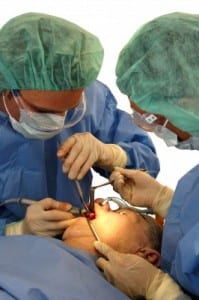 You might be one of the many people who grind their teeth while asleep and not even know that you are doing it. It is not a trifling matter either, for it can have consequences for the health of your mouth. With the help of your local dentist you can get to the bottom of problems with teeth grinding so that it is stopped and you are able to rest assured that you are not compromising the health of your mouth.
You might be one of the many people who grind their teeth while asleep and not even know that you are doing it. It is not a trifling matter either, for it can have consequences for the health of your mouth. With the help of your local dentist you can get to the bottom of problems with teeth grinding so that it is stopped and you are able to rest assured that you are not compromising the health of your mouth.
There appear to be two main causes of what is professionally known as bruxism. Patients sometimes grind their teeth in their sleep for reasons of stress. If life is getting on top of people then this can manifest itself in all sorts of ways, teeth grinding being one of them. Therapy might be required in these cases so that the root cause is stopped.
What dentists are most concerned with are people who grind their teeth in their sleep because their bite is misaligned. In all cases of bruxism there is a risk that teeth can become physically broken down over time. Cracks might begin to appear and if the enamel is sufficiently worn away then tooth decay presents itself as a greater risk because the integrity of the tooth is less protected.
City of Leeds dentists can help put a stop to this by either fitting patients with a brace so that any alignment issues are sorted out or by making a mouth guard for the patient to wear at night. A mouth guard worn on the teeth will help take the impact out of the process of teeth grinding and stop teeth from being worn down.





 Sleep apnea is one of those conditions, like snoring and teeth grinding that you may be blissfully unaware of, until you happen to share a room with another person. It is a condition that refers to the irregularity of the way you breathe- more commonly recognised as the pauses between breathing or it can be abnormally slow breathing, whilst sleeping. When you ‘drop off’ at night, you’re body goes into automatic. Your brain signals the lungs to draw air, so that the heart can continue to pump blood around the body. Stop the flow of air and all three hit the panic button, as they all rely on each other to function. You really, needn’t be told how serious an irregular heartbeat can be, especially when you are unconscious, because you can’t do anything about. If you are showing signs of extreme tiredness and fatigue when you wake and that persists throughout the day, you may be a victim of sleep apnea. Firstly, you may be referred to a sleep clinic to assess the problem, after which it can be treated- though there are a lot of methods to address the problem. Lifestyle and diet change are the more common suggestions after you have put yourself through a life management program. Exercise is also recommended, to understand the way you breathe. A dentist can also recommend a breathing device along with certain medications to keep the airways free at night. More radically, the problem may require surgery.
Sleep apnea is one of those conditions, like snoring and teeth grinding that you may be blissfully unaware of, until you happen to share a room with another person. It is a condition that refers to the irregularity of the way you breathe- more commonly recognised as the pauses between breathing or it can be abnormally slow breathing, whilst sleeping. When you ‘drop off’ at night, you’re body goes into automatic. Your brain signals the lungs to draw air, so that the heart can continue to pump blood around the body. Stop the flow of air and all three hit the panic button, as they all rely on each other to function. You really, needn’t be told how serious an irregular heartbeat can be, especially when you are unconscious, because you can’t do anything about. If you are showing signs of extreme tiredness and fatigue when you wake and that persists throughout the day, you may be a victim of sleep apnea. Firstly, you may be referred to a sleep clinic to assess the problem, after which it can be treated- though there are a lot of methods to address the problem. Lifestyle and diet change are the more common suggestions after you have put yourself through a life management program. Exercise is also recommended, to understand the way you breathe. A dentist can also recommend a breathing device along with certain medications to keep the airways free at night. More radically, the problem may require surgery. Living and working in the city of Leeds can be exciting but at the same time, very stressful, and stress is one of those modern problems that’s easy to overlook- and it throws up side affects that you may not notice at first. One such problem is teeth grinding and it’s an important issue to get under control, for it can cause all manner of problems throughout the upper body. A lot of pressure is put on the joints between the upper and lower jaws, but if this starts to suffer from overload, it can cause damage to the ears, the head neck, and the upper back; teeth grinding can compound the problem so there is a great need to get your stress and behaviour managed. It’s important to identify daytime stresses so that you have a chance to unwind in the evening before you go to sleep, for it’s here that most of the grinding will take place. A dentist can always supply you with a mouth guard, but that will only protect the teeth; the physical grinding will still continue and so will the pressures on the jaws. Before you go to sleep, it’s important to prepare yourself and learn to relax. You should avoid any form of caffeine and opt for herbal teas before bed; baths with essential oils, the burning of herbal oils, reading and ‘chilling out’ to calming music are excellent ways to de-stress. If you have any issues with this problem, it’s important to seek out advice from your dentist.
Living and working in the city of Leeds can be exciting but at the same time, very stressful, and stress is one of those modern problems that’s easy to overlook- and it throws up side affects that you may not notice at first. One such problem is teeth grinding and it’s an important issue to get under control, for it can cause all manner of problems throughout the upper body. A lot of pressure is put on the joints between the upper and lower jaws, but if this starts to suffer from overload, it can cause damage to the ears, the head neck, and the upper back; teeth grinding can compound the problem so there is a great need to get your stress and behaviour managed. It’s important to identify daytime stresses so that you have a chance to unwind in the evening before you go to sleep, for it’s here that most of the grinding will take place. A dentist can always supply you with a mouth guard, but that will only protect the teeth; the physical grinding will still continue and so will the pressures on the jaws. Before you go to sleep, it’s important to prepare yourself and learn to relax. You should avoid any form of caffeine and opt for herbal teas before bed; baths with essential oils, the burning of herbal oils, reading and ‘chilling out’ to calming music are excellent ways to de-stress. If you have any issues with this problem, it’s important to seek out advice from your dentist.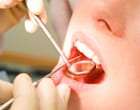 Just as common as snoring but not nearly as talked about, grinding your teeth in your sleep can have fairly serious repercussions and ought to be taken seriously. As the condition concerns your mouth, your dentist is able to help in diagnosing teeth grinding and then formulating an appropriate response.
Just as common as snoring but not nearly as talked about, grinding your teeth in your sleep can have fairly serious repercussions and ought to be taken seriously. As the condition concerns your mouth, your dentist is able to help in diagnosing teeth grinding and then formulating an appropriate response. Having a crooked smile can lead to embarrassment in social situations as you try and hide your mouth, ashamed of the way your smile looks. Crooked or misaligned teeth are a common problem in the United Kingdom and you should be prepared to go to your dentist and ask for more information about how to rectify the problem. Aside from the aesthetics involved, misaligned teeth have also been implicated in cases of teeth grinding and even TMJ.
Having a crooked smile can lead to embarrassment in social situations as you try and hide your mouth, ashamed of the way your smile looks. Crooked or misaligned teeth are a common problem in the United Kingdom and you should be prepared to go to your dentist and ask for more information about how to rectify the problem. Aside from the aesthetics involved, misaligned teeth have also been implicated in cases of teeth grinding and even TMJ. If you are one of these people in the city of Leeds that live alone and suffer from stress or anger problems, there’s a very good chance you may grind your teeth (more commonly known as Bruxism), and you may also be completely unaware of the problem. But it’s not a problem to be ignored as it can lead to many problems throughout the upper body. The obvious symptoms of teeth grinding are aching jaws, headaches, neck pain and stress in the shoulders; if these symptoms prevail, you should consult your dentist. They may recommend tooth guards, splints or even dental overlays to avoid damage to the teeth, but the jaw will still undergo strain from the desire to grind. Bruxism is directly linked to stress and a hectic lifestyle. But once the problem is identified, it can be addressed. Stress management can reduce the level of teeth grinding through identifying the causes of stress and learning how to unwind after a heavy day. There are many relaxing techniques that can be used to help the body to de-stress before sleeping. If you go to sleep once you have unwound and calmed the body down, there chances of teeth grinding are greatly reduced.
If you are one of these people in the city of Leeds that live alone and suffer from stress or anger problems, there’s a very good chance you may grind your teeth (more commonly known as Bruxism), and you may also be completely unaware of the problem. But it’s not a problem to be ignored as it can lead to many problems throughout the upper body. The obvious symptoms of teeth grinding are aching jaws, headaches, neck pain and stress in the shoulders; if these symptoms prevail, you should consult your dentist. They may recommend tooth guards, splints or even dental overlays to avoid damage to the teeth, but the jaw will still undergo strain from the desire to grind. Bruxism is directly linked to stress and a hectic lifestyle. But once the problem is identified, it can be addressed. Stress management can reduce the level of teeth grinding through identifying the causes of stress and learning how to unwind after a heavy day. There are many relaxing techniques that can be used to help the body to de-stress before sleeping. If you go to sleep once you have unwound and calmed the body down, there chances of teeth grinding are greatly reduced.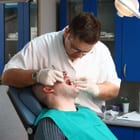 Bruxism is the activity of grinding your teeth during sleep. Although as common as snoring, bruxism can easily go unnoticed but it ought to be dealt with to avoid potentially serious complications with the teeth and jaw. Being sure to keep in regular contact with your dentist is a good way to guard against bruxism and its effects.
Bruxism is the activity of grinding your teeth during sleep. Although as common as snoring, bruxism can easily go unnoticed but it ought to be dealt with to avoid potentially serious complications with the teeth and jaw. Being sure to keep in regular contact with your dentist is a good way to guard against bruxism and its effects.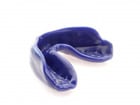 Mouth guards are used all around central Leeds. They are more normally associated with sports, especially contact sports like boxing or rugby, but they are also used in some dental procedures. If you work hard, it’s relaxing to play hard and a lot more of us are turning to sport to blow off steam. However, quite a percentage of sports will require you to wear a mouth guard. Now you’d think that it’s only to stop your teeth getting knocked out (well yes), but a good mouth guard can prevent very serious injuries from occurring. They can protect lips and gums, and prevent neck and jaw injuries that can be costly to repair. There are three types of sporting mouth guards on the market: one you buy off the shelf, another that you mould into your mouth or one that you can have custom made for you. When it comes to dentistry, they too have uses here. In our endless search for nice teeth, home bleaching kits are becoming very popular, incorporating a tight fitting gum shield to put the bleaching agent in. Orthodontic aligners such as Invisalign are clear, thin, guard shaped aligners that help straighten the teeth. Mouth guards also help in the treatment of bruxism or teeth grinding.
Mouth guards are used all around central Leeds. They are more normally associated with sports, especially contact sports like boxing or rugby, but they are also used in some dental procedures. If you work hard, it’s relaxing to play hard and a lot more of us are turning to sport to blow off steam. However, quite a percentage of sports will require you to wear a mouth guard. Now you’d think that it’s only to stop your teeth getting knocked out (well yes), but a good mouth guard can prevent very serious injuries from occurring. They can protect lips and gums, and prevent neck and jaw injuries that can be costly to repair. There are three types of sporting mouth guards on the market: one you buy off the shelf, another that you mould into your mouth or one that you can have custom made for you. When it comes to dentistry, they too have uses here. In our endless search for nice teeth, home bleaching kits are becoming very popular, incorporating a tight fitting gum shield to put the bleaching agent in. Orthodontic aligners such as Invisalign are clear, thin, guard shaped aligners that help straighten the teeth. Mouth guards also help in the treatment of bruxism or teeth grinding. Have you noticed that your teeth have been worn down considerably? Does your jaw hurt or your head ache most of the time? Do you have difficulty sleeping, and have you experienced loss of appetite. According to a City of Leeds dentist, the presence of most of these symptoms means that you have to see a dentist immediately because you probably suffer from Bruxism.
Have you noticed that your teeth have been worn down considerably? Does your jaw hurt or your head ache most of the time? Do you have difficulty sleeping, and have you experienced loss of appetite. According to a City of Leeds dentist, the presence of most of these symptoms means that you have to see a dentist immediately because you probably suffer from Bruxism.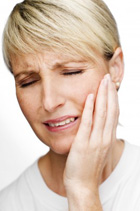 Do you suffer from frequent and intense headaches that leave you at the mercy of painkillers? Have you had your eyes checked, but to no avail, because the headaches persist no matter what else you do? According to a well renowned dentist in the City of Leeds, the reason could be that you have unresolved dental issues. After all, the teeth and jaws are very close to the forehead and temples, and any muscular pain caused by dental problems can easily spread upwards.
Do you suffer from frequent and intense headaches that leave you at the mercy of painkillers? Have you had your eyes checked, but to no avail, because the headaches persist no matter what else you do? According to a well renowned dentist in the City of Leeds, the reason could be that you have unresolved dental issues. After all, the teeth and jaws are very close to the forehead and temples, and any muscular pain caused by dental problems can easily spread upwards.

